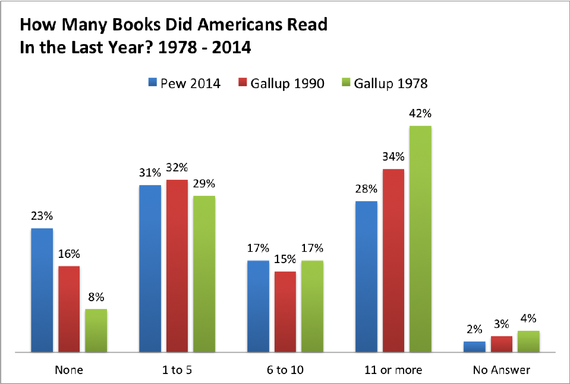My $100 000 question is this: of the mountain of published material coming out, how much is actually any good? Good characters, good plots, good writing? More than before?
I assume that self-publishing authors are what fluff up the numbers of books out, in which case it's normal for the overall quality of material out there to drop. I'm not saying all self-pub is rubbish, and I'm not saying all trad-pub is good, but in the grand scheme of things, drawing averages, self-pub is much less regulated, and there are no real quality standards to uphold. So without being an expert, it seems logical to me that the surge in quantity would decrease overall quality, no question. The "good" book/"bad" book ratios cannot be the same as they were "back in the day". Disclaimer: it is worth noting that a "good" book is not necessarily a "successful" book, but you get my point.
I suspect anyone reading 1-3 books a year is not going to be your blockbuster setter. In fact I know a few of those and they tend to either read non-fiction or literary works more than they would anything that I'd read or author.
The 1-3 book-a-year-crowd don't really seem like genre readers to me (I know quite a few of them), so I don't know how skewed these stats are towards SFF in particular. 1-3s, they're happy to read the flavour of the month or best-selling cop thriller/rom. They follow trends, they don't set them. I would think genre garners, generally, more avid/loyal readers than the less-escapist lit. Then again, I'm assuming. Are there any stats on this?
How about crossing over from one genre to another? To me, SFF readers are every bit as exclusive in their choices as non-SFF readers. They won't usually mix. The average reader enjoying Mieville will never pick up Jane Austen, and vice-versa (probably not a good example though). I've always thought that general book sales and stats don't accurately reflect the patterns/problems/successes of SFF. But again, I'm talking outta my arse. If you've got more palpable data on this, please do show.
IMO, the rate of growth in numbers will eventually kill the industry as it is now. It seems clear to me there needs to be an evolution of platforms. We're in the dying Blockbuster age, and we need Netflix to come around and change the way business works. This all feels unsustainable long-term. I just hope this surge of books is just a cyclical phenomenon (as a writer and reader, I realize that's not very nice to say, but there's just so much fluff out there). Picking out a book to read nowadays has become such a lottery...




